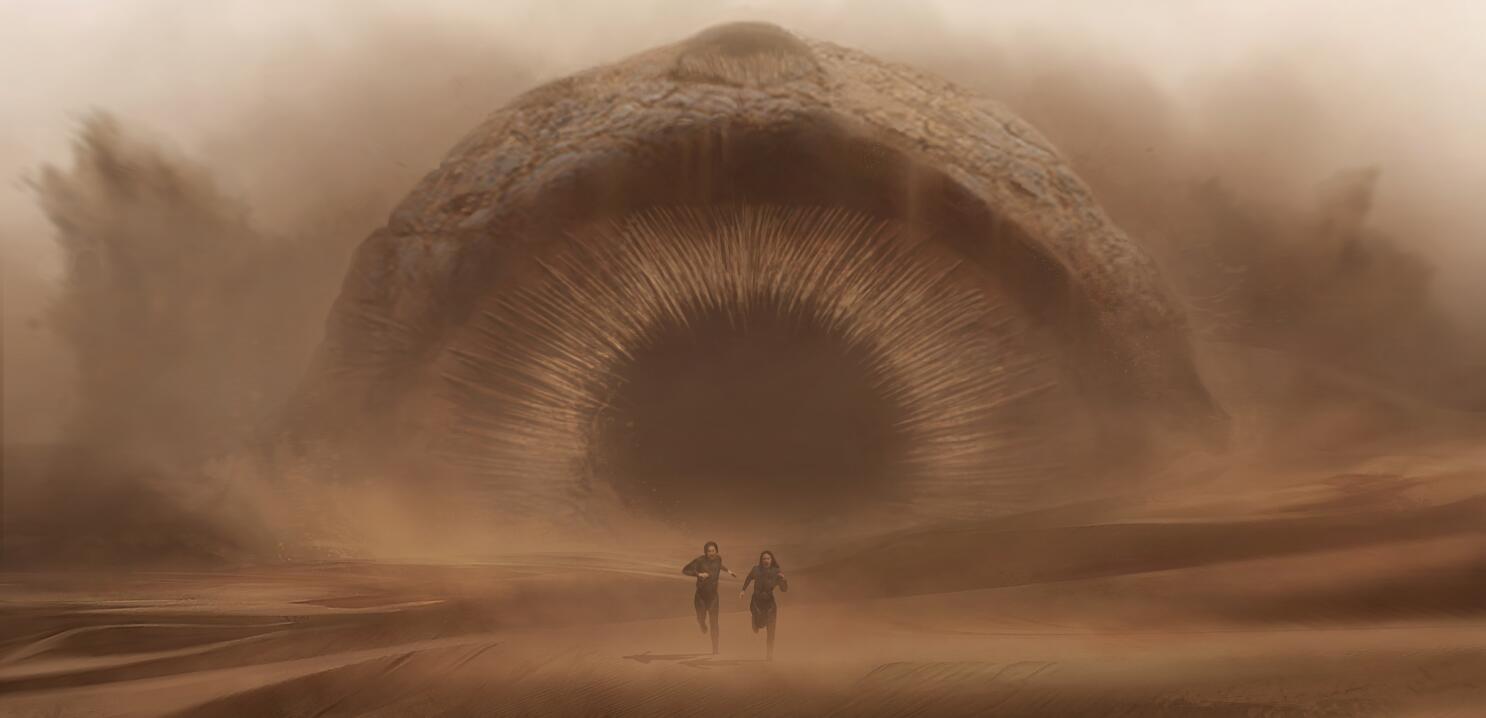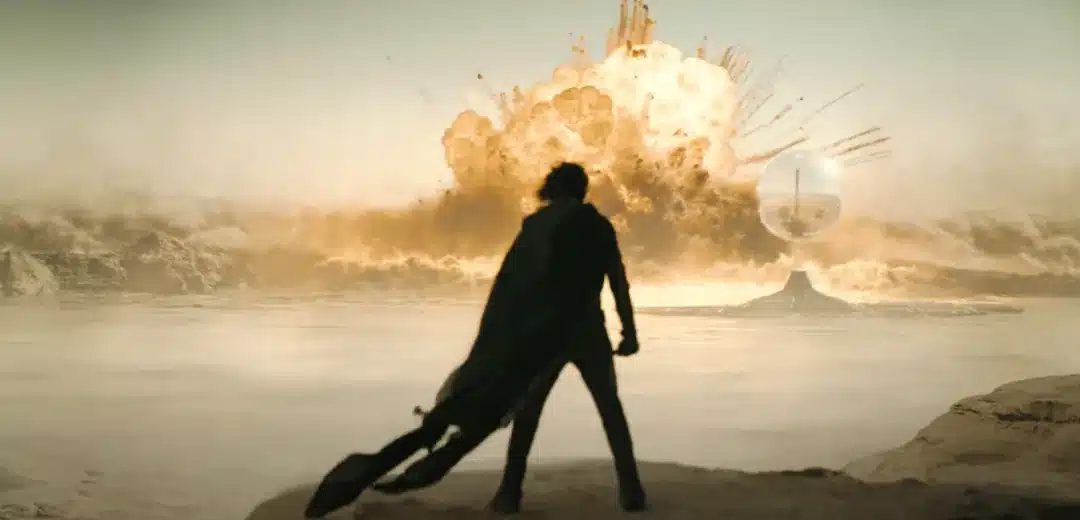Since its advent to Hollywood, the Dune franchise has been a cinematic experience like no other. But the stylistic choices and political messaging reveal a deeper narrative that has recently been subject to more negative scrutiny. With all the cultural inspiration from the Middle East, should Dune have a cast of Middle Eastern actors?
Dune 2 starts where its predecessor left off. Paul Atreides and his mother Rebecca have fled the collapse of House Atreides and now call the sands of Arrakis their home. Assumed dead by the rest of the nobility, the two must now contend with a spreading prophecy. According to the Bene Gesserit, a powerful sisterhood of divination, a Messiah will one day lead the Fremen to prosperity. Whether Paul is this messiah—this Lisan al-Gaib—is the crux of this film’s conflict.
The Real-World Influences of Dune 2
From both the original novel and its adaptations, viewers have noted a significant incorporation of Middle Eastern and North African (MENA) cultural elements.
For example, the sandworms that live buried in the dunes are known as the Shai-Hulud. In Arabic this roughly translates to “thing of eternity,” which elucidates the creature’s thematic significance. Paul proves himself by learning to ride the Shai-Hulud, grasping at “the eternal thing” and joining it in harmony. The Fremen then ceremoniously dub him the Lisab al-Gaib—another Arabic phrase which means “the tongue of the absent one.” In the Fremen language, however, it is “The Voice from the Outer World,” alluding to the mystical weaponized Voice of the Bene Gesserit and of Paul himself.

The Fremen have another word for Paul: Mahdi. “The One Who Will Lead Us to Paradise.” This is directly taken from an actual Islamic belief in which a descendant of Muhammed will appear at the End of Time to deliver peace and justice. Paul Atreides supposedly fits this bill.
However, it is important to note that Dune doesn’t just take from MENA culture. Roy Schwartz, a pop culture historian and critic, takes careful note of the additional influences. Names and concepts such as Chani, Bene Gesserit, and Kwisatz Haderach are taken directly or loosely from the Hebrew language. Schwartz holistically cites Abrahamic religion as a wellspring of cultural borrowings: “‘messiah’ is an Abrahamic term, originating in Judaism and found in Christianity and Islam as well. The word comes from Hebrew (pronounced mashi-ach), literally meaning ‘the anointed one.'”
That said, the Arab influence is undeniable. All these cultural borrowings, as well as the desert landscape and costuming, understandably evoke the rich history and mythology of the Middle East.
Potential Politics: What Are They Trying to Say?
A large part of Dune‘s premise is the noble houses’ insatiable lust for power in the form of melange, the psychedelic spice native to Arrakis. It grants powers of prescience, heightened senses and vitality, and a sensation akin to drug-induced stimulation. Spice production is the boon of the wealth economy and the devastation of the native Fremen. Since the aesthetics are heavily based on MENA culture, viewers naturally thought of the Western occupation of the Middle East. The US’s search for oil in Iran particularly came to mind, but Herbert has never substantiated this connection. In fact, the spice in Dune is more likely to do with Herbert’s relationship with actual drugs. He had taken peyote, a hallucinogenic plant, and based melange’s effects on the feeling of taking mushrooms. The oil analogy is entirely speculative.
While Arrakis can be a stand-in for the Middle East’s historical struggles, there are many real-world regions that have suffered similarly. People might also think of the colonization of the Americas and the destruction of the native environment for profit. Schwartz likens this political messaging to that of the Avatar franchise: “an indigenous people seeking only to live in peace, away from the rapacious machinations of galactic powers.” The popular interpretation of Arrakis is then perhaps informed by the ever-changing geopolitical relevancy of the time.
This doesn’t mean the comparisons to Middle Eastern history are unfounded. When creating Paul’s character, Herbert borrowed heavily from T. E. Lawrence’s supposed messianic role in the Arab revolt against the Ottoman Empire. Connections between Dune and the 1962 film Lawrence of Arabia consequently emerged, as both are, according to writer Radheyan Simonpillai for Everything Zoomer, “rousing spectacles about rebellion and warfare trip-wired with a deflating and purposeful cynicism.”
While many criticize this archetype as leaning into the “white savior” trope, others recognize that it might instead be “a sweeping and critical view of how such destructive, self-styled saviours are deluded by a mirage of their own.” Paul represents the Fremen’s salvation but is likely their ruination.
Casting Dune 2: The Controversy Deepens
A main point of rising controversy is the fact that Dune lacks any MENA actors in major roles. While the Fremen are mostly non-white, Zendaya is half-Nigerian, and Javier Bardem is Spanish. Casting Timothee Chalamet as the prophesied Paul seems a more intentional choice, though some wonder if even subverting the “white savior” trope is perpetuating its racist implications. In any case, none of the people who “should” be Middle Eastern are played by Middle Eastern people.
A consequence of the casting that many have pointed out is that all the Arabic words are severely butchered. None of the cast can capture the precise inflections and syllables of the language. Even if it isn’t actually Arabic, many of the phrases are directly borrowed and then inconsistently pronounced throughout both films.
Something else to note is how much of the original cultural influences director Denis Villeneuve chose to remove from the films. When Herbert wrote Dune, editors disapproved of the amount of “Muslim flavour” injected into the worldbuilding. Herbert actually used the word “jihad” (the concept of struggle in Islam), which the film replaced with “holy war.” Furvah Shah, for Cosmopolitan, theorizes that this happened because “‘jihad’ is now unfortunately synonymous with violence and terror.”
Shah reads this removal as part of an attempt to scrub away all MENA culture “if it didn’t serve an aesthetic purpose.” What’s left, according to him, is an exoticized version of the Middle East, void of any substance or true representation. People have debated the topic of cultural appropriation for years, and this might only fuel such discourse.
How Can We Judge a Work of Fiction?
Or, can we judge a work of fiction at all? The signs point to yes, but there are a few caveats. It’s always important to acknowledge the distinction between political commentary in fiction and true politics. Dune is, ultimately, a franchise of novels and films depicting fictitious events in a fictional world. It should not have to make sweeping statements on actual geopolitical relations or stick to only one culture to represent thoroughly.
When analyzing a work of fiction, it’s important to understand that taking inspiration from something, or even being an allegory for something, doesn’t mean it’s a 1:1 correlation. It’s perfectly fine for a story to pick and choose. Dune, for example, is a hodgepodge of influences, some from Middle Eastern and North African cultures, but the thematic consistency is, at best, questionable, so we should be careful not to read too much into it or project our own preconceptions.
Roy Schwartz, author of Is Superman Circumcised? The Complete Jewish History of the World’s Greatest Hero
That being said, much of this criticism comes directly from viewers of MENA descent uncomfortable with the representation of their culture. Ignoring their insight could be, at best, slightly irresponsible and, at worst, part of a larger pattern of silencing, even erasing, people of color in media. The relationship between fiction and reality fluctuates by the day. For some, Dune is nothing but great sci-fi. For others, it reveals something about our world. But for many, it doesn’t reveal it properly.
There is something to say about the film adaptations taking care to remove certain cultural references while keeping others. And it’s certainly not unheard of for filmmakers to gesture at real-world cultures without the guts to represent their real-life history or talent.
Whether it is fear or simply storytelling, Dune does not exist in a vacuum of political narratives. It stands in a line of unanswered questions and ongoing debates. Fictional representation may be just that—fictional—but that doesn’t mean it’s not worth talking about.
Dune 2 is out in theaters now.







Shankar Narayan
April 12, 2024 at 1:03 am
Oshmi, you were there and not there. A film like Dune 1,2 has a narrative which is subjective to audience’s perception. So I was waiting for a deep narrative as perceived by you, may be fictional or drawing from your Indian roots. I have read similar fictional stories based on mythology from author Amish Tripathy, who is bold to set his own narrative, the depth of which is a pleasure. I want you not to sigh away from your own take, like Nolan who gives his own side of fictional story.
Oshmi, you write well and balanced view point on the going basis. Take a side. You will be hero worshipped with your caliber. Stay Blessed !!
Rajesh Ghosh
April 12, 2024 at 3:56 am
Well rounded review covering multiple aspects about the movie. Especially liked the real world influence section!